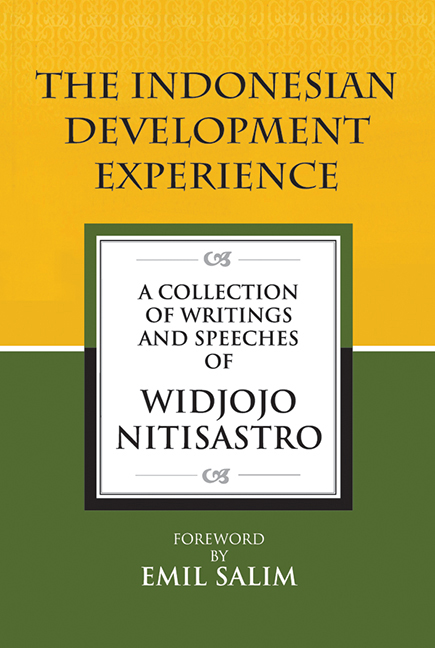Book contents
- Frontmatter
- Dedication
- Frontispiece
- Contents
- Foreword
- Introduction
- Part I PLANNING OF INDONESIA'S DEVELOPMENT
- 1 Economic Analysis and Development Planning (1963)
- 2 Imprudent Economic and Financial Policies (1966)
- 3 Restructuring Indonesian Economic Fundamentals with Economic Principles (1966)
- 4 Contribution of Ideas of the Faculty of Economics, University of Indonesia to the Session of the Provisional People's Consultative Assembly (MPRS) (1966)
- 5 Comparison between Articles of the Contribution of Ideas of the Faculty of Economics, University of Indonesia to the Decision of the Provisional Consultative Assembly No: XXIII/MPRS/1966 (1966)
- 6 The Essence and Consequences of MPRS Decree No. XXIII, Year 1966, on Economic, Financial and Development Matters (1966)
- 7 Challenges in Increasing Food Production in Indonesia (1968)
- 8 The Basic Framework of the Five-Year Development Plan (REPELITA) (1968)
- Part II IMPLEMENTATION OF INDONESIA'S DEVELOPMENT
- Part III FACING VARIOUS ECONOMIC CRISES
- Part IV SETTLEMENT OF FOREIGN DEBT
- Part V EQUITABLE DEVELOPMENT
- Part VI INDONESIA AND THE WORLD
- Index
- About the Author
2 - Imprudent Economic and Financial Policies (1966)
from Part I - PLANNING OF INDONESIA'S DEVELOPMENT
Published online by Cambridge University Press: 21 October 2015
- Frontmatter
- Dedication
- Frontispiece
- Contents
- Foreword
- Introduction
- Part I PLANNING OF INDONESIA'S DEVELOPMENT
- 1 Economic Analysis and Development Planning (1963)
- 2 Imprudent Economic and Financial Policies (1966)
- 3 Restructuring Indonesian Economic Fundamentals with Economic Principles (1966)
- 4 Contribution of Ideas of the Faculty of Economics, University of Indonesia to the Session of the Provisional People's Consultative Assembly (MPRS) (1966)
- 5 Comparison between Articles of the Contribution of Ideas of the Faculty of Economics, University of Indonesia to the Decision of the Provisional Consultative Assembly No: XXIII/MPRS/1966 (1966)
- 6 The Essence and Consequences of MPRS Decree No. XXIII, Year 1966, on Economic, Financial and Development Matters (1966)
- 7 Challenges in Increasing Food Production in Indonesia (1968)
- 8 The Basic Framework of the Five-Year Development Plan (REPELITA) (1968)
- Part II IMPLEMENTATION OF INDONESIA'S DEVELOPMENT
- Part III FACING VARIOUS ECONOMIC CRISES
- Part IV SETTLEMENT OF FOREIGN DEBT
- Part V EQUITABLE DEVELOPMENT
- Part VI INDONESIA AND THE WORLD
- Index
- About the Author
Summary
Introductory Note: Two important events took place in early January 1966: Huge student rallies to protest the government's attitude toward a recent coup known as the G30S/PKI and a week-long seminar organized by the Indonesian Students Action Front (KAMI) of the Faculty of Economics of the University of Indonesia (FEUI), a group that opposes the existing government's economic and financial policies. The packed seminar featured speakers from University of Indonesia (UI), as well as from outside the university. Among the UI speakers were Professor Sumantri Brodjonegoro (UI Rector), Professor Moh. Sadli, Professor Subroto, Professor Ali Wardhana, Professor Emil Salim and myself (all from FEUI). Proceedings from the seminar were published into a book titled “The Leader, the Man and the Gun” inspired by the title of the presentation made by Sri Sultan Hamengku Buwono IX in the seminar.
P.A. Baran, a well-known Marxist, pointed out the difference between an “intellectual worker” and an “intellectual” in his article entitled: “The Commitment of the Intellectual”. The first one employs his intellect and his brain in the way a “manual worker” utilizes his hands. In other words, an “intellectual worker” is a craftsman whose strength and skills lie in his brain power, not his muscle or the agility of his hands. The skill of a soldering worker, for example, is put to a test when he plugs holes in a pan or a cooking pot, for which he is paid for. He is not asking, nor does he care about, what the pan or the cooking pot is used for; closing the holes is all he cares about. Similarly, all an “intellectual worker” does is “sell his brain”. He does not care about the impact of the use of his brain. An “intellectual worker”, according to Baran — in C.P. Snow's words — has the attitude that:
“… we produce the tools. We stop there. It is for you, the rest of the world, the politicians, to say how the tools are used. The tools may be used for purposes which most of us would regard as bad. If so, we are sorry. But, as scientists, this is no concern of ours.”
- Type
- Chapter
- Information
- The Indonesian Development ExperienceA Collection of Writings and Speeches, pp. 18 - 24Publisher: ISEAS–Yusof Ishak InstitutePrint publication year: 2011

